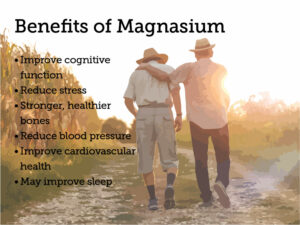How Magnesium Affects Your Health
Magnesium is a mineral that’s abundant in the human body, and it’s naturally present in many of the foods we eat. It’s essential for human health, playing a role in more than 300 biochemical functions in the body, including vitamin D absorption. Getting enough magnesium can help with muscle cramps, migraines, blood pressure, osteoporosis, and even lower the risk of bone fractures, heart disease, and stroke.
Magnesium also functions as an electrolyte, having a positive electrical charge. Because of this, your muscles and brain rely heavily on magnesium to do their job. As important as magnesium is, most of us don’t get enough.
Magnesium Deficiency
It’s estimated that around 50% of Americans don’t get the recommended amounts of magnesium. It’s hard to determine whether someone is getting enough since blood tests don’t accurately reflect the amount of magnesium in the body. Most of our magnesium is usually stored in our muscles and bones. Tracking dietary intake is currently the most accurate way to determine magnesium status. Additionally, if you’re suffering from any of the following symptoms you may not be getting enough magnesium.
Magnesium Deficiency Symptoms

- Muscle twitches and cramps
- Apathy and low emotion
- Osteoporosis
- Fatigue and muscle weakness
- High blood pressure
- Asthma
- Irregular heartbeat
- Migraines
Causes of Magnesium Deficiency
Many of the foods richest in magnesium, such as nuts and legumes, contain phytates which hinder magnesium’s absorption. Phytates bind to magnesium in the gut, reducing the mineral’s bioavailability.
High doses of zinc can compete with magnesium’s absorption. So, if you’re one of those folks who takes a lot of zinc during cold season, you may be compromising your magnesium.
Alcohol promotes excretion of magnesium in the urine. Also, mental and physical stress can lead to a significant loss of magnesium, with stress hormones such as cortisol accelerating the mineral’s depletion. If you drink beer and eat nuts when you’re stressed, you’re really increasing your chances of being magnesium deficient.
How Much Magnesium Do You Need
The amount of magnesium you need varies by age, sex, and life stage. Children only need about half as much as adults. Most women need around 320 milligrams per day, and men need around 420 milligrams.
For people who engage in physical activity, the demand for magnesium increases by as much as 20 percent due to increased loss through sweat and physical activity, which depletes magnesium. This elevated requirement emphasizes the mineral’s pivotal role in muscle function, energy, metabolism, and maintaining electrolyte balance—essential aspects of athletic performance and recovery.
Best Food Sources
The richest food sources of magnesium include:
- Green leafy vegetables, especially spinach
- Avocadoes
- Dark chocolate
- Nuts: almonds, hazelnuts, cashews, and peanuts
- Seeds: pumpkin seeds and sunflower seeds
Magnesium Supplements
If you suffer from some of the symptoms of magnesium deficiency in spite of eating plenty of magnesium-rich foods, you may want to consider taking a magnesium supplement. Figuring out what to take can be confusing since there are about 10 different types of magnesium supplements. Which one is the right one?
First thing to keep in mind: magnesium citrate is typically used as a laxative. It can cause gastrointestinal distress, so stay away from that one unless you need to clean things out.
Organic magnesium salts like magnesium glycinate and taurate offer superior bioavailability and are gentler on the digestive system. Magnesium taurate is composed of magnesium and the amino acid taurine. It’s been shown to be particularly effective at reducing blood pressure.
Magnesium glycinate is a compound formed from magnesium and the amino acid glycine. Glycine has been shown to improve sleep. Observational studies have shown a positive association between magnesium status and sleep quality. Randomized clinical trials have shown mixed reviews on magnesium’s ability to improve sleep. But there’s a lot of hope that the combination of magnesium and glycate will have an overall greater effect of improved sleep.
The fourth type of magnesium supplement we need to discuss is magnesium threonate, which is a salt formed from mixing magnesium and threonic acid. This form of magnesium has gained a lot of attention because of its ability to cross the blood-brain barrier, suggesting it provides cognitive benefits. The science supporting this idea is still developing. If you’re interested in taking a supplement that could potentially prevent memory loss and Alzheimer’s, this might just be an option.
Why You Might Want to Take Magnesium Supplements
Brain Health: Magnesium intake is linked to improved cognitive function and has shown potential in managing migraine symptoms, likely due to its role in regulating neurotransmitters and protecting against neuroinflammation.

Managing Stress: Both physical and mental stress deplete magnesium. Because magnesium plays a critical role in so many biological functions, increasing magnesium intake during times of stress could be extremely beneficial, especially for athletes.
Relieving Depression: Supplementing with 125 – 300 mg of magnesium (as glycinate or taurinate) with each meal and at bedtime has been shown to produce rapid recovery (less than 7 days) from major depression. If you’re feeling down, you might want to try something as safe and inexpensive as magnesium before reaching out to your doctor for an antidepressant.
Bone Health: Magnesium is stored in your bones. It’s an important mineral that works synergistically with calcium and vitamin D to make bones strong and healthy. If you’re magnesium-deficient because you’re not eating enough green vegetables, or you’re under too much stress, your body will tap into bone magnesium stores. Over time, this will compromise the density of your bones.
Cardiovascular Health: Magnesium deficiency increases your risk of just about every type of cardiovascular disease. Also, if you have high blood pressure, it could be the result of a magnesium deficiency. If your blood pressure is borderline, you may want to try supplementing with magnesium before your doctor puts you on blood pressure meds.
If you’re planning on trying a magnesium supplement, it’s best to take smaller doses (50 – 150 mg) several times a day. Your body can only absorb so much magnesium at once. And taking a large dose can upset your stomach.
As always, it’s a good idea to talk to your doctor before taking any supplement.
Stay Strong,
Bo Railey

